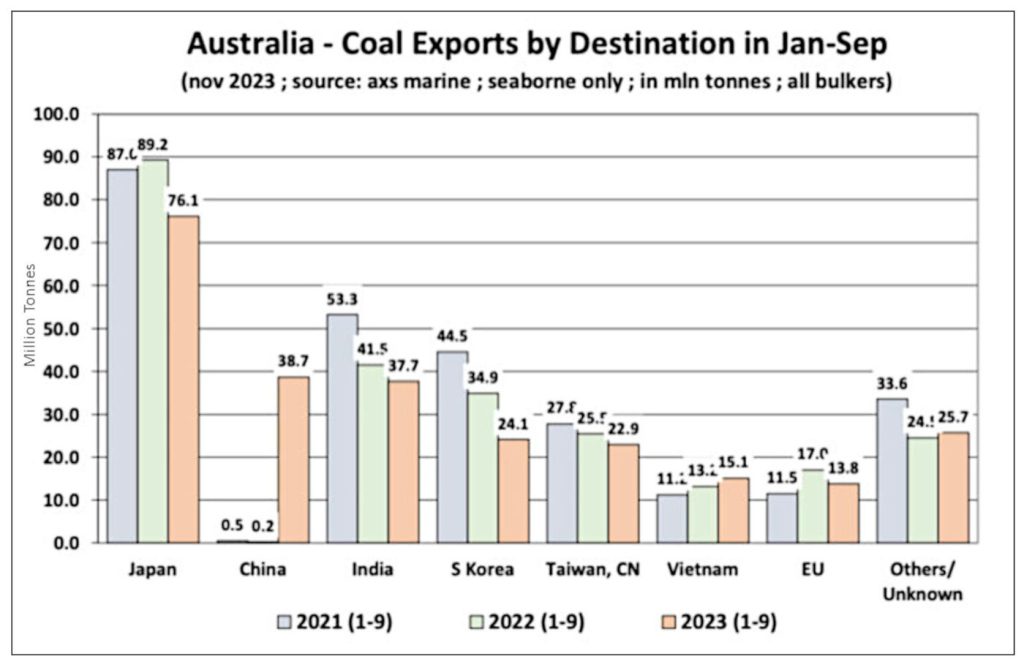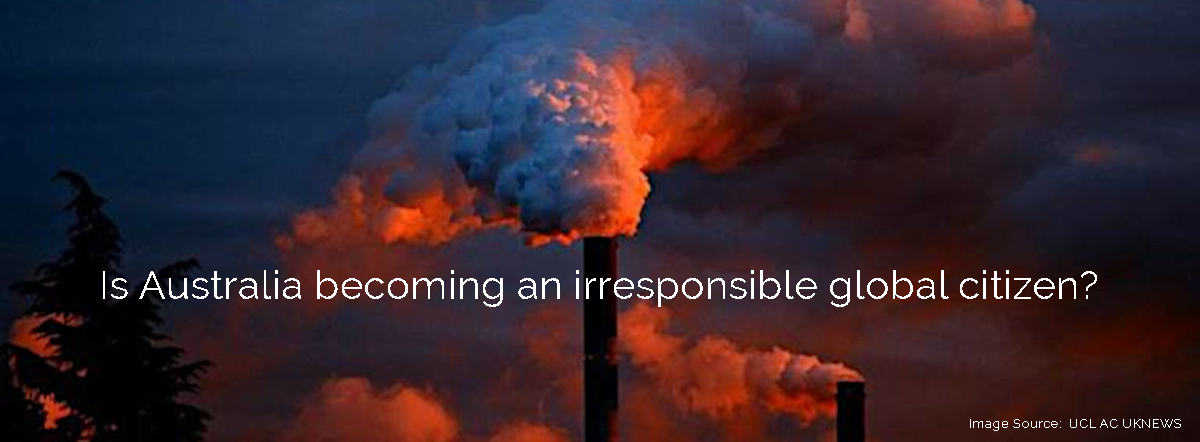Australia’s race to the bottom in tackling climate change at home and exporting
hundreds of millions of tonnes of greenhouse gas emissions every year
In a “re-commitment ceremony” last week Peter Dutton reaffirmed the coalition “marriage” to the mining industry. Dutton’s “unashamed” support and encouragement for miners came as no great surprise as he addressed the annual conference of the Mineral Council of Australia in Canberra. However, what did surprise was Dutton’s disturbing vows to abandon Australia’s medium-term carbon budget while slashing the power and influence of environmental groups that question or oppose projects, to limit the ability of third party challenges to decisions concerned with the protection of biodiversity, and specifically, and to defund the Environmental Defenders Office, an Australian NGO that not only provides legal advice and lawyers to support environmental issues, but also ensures that important and often controversial information and issues are brought to public attention when government and industry transparency is all too often missing or the details screened in complicated narrative.1
The mining industry has been, and will continue to be an important part of Australia’s economy, albeit enjoying a privileged position not matched by any other sector of Australia’s economy. Under inadequate, and sometimes delinquent, observation by government, some miners fail to repatriate mine sites; damage natural water sources; obscure the true emissions from mining operations; and disrespect, damage and destroy indigenous cultural areas. Mining does not create anything, does not manufacture anything and after initial set up costs is a wholly exploitative operation digging up or sucking out raw materials, that actually belong to all Australians, then selling those materials while paying next to nothing in royalties, compared to the mega-profits being made. It is a unique and extremely fortunate situation for stake holders.
AUSTRALIA’S MINING INDUSTRY PROVIDES A UNIQUE AND
FORTUNATE SITUATION FOR STAKE HOLDERS
The current Labor government was elected on a platform of which dealing with climate change was a major part. Towards the end of their term in government Labor has so far fallen well short of most voters expectations of them in regard to climate change. Under Labor, Australia has maintained it’s unenviable position of being the third largest exporter of fossil fuels in the world. Since May 2022 the Federal Environment Minister has approved 4 new coal mines with a total of 55 million tonnes of coal and 156 million tonnes of emissions. On top of this, there are another 28 proposed coal mines seeking approval with a total of 5,382 million tonnes of coal and an astounding 13,135 million tonnes of emissions!2
For more detailed information on individual coal mine proposals and emissions numbers, there is an invaluable online resource available thanks to The Australia Institute named … Coal Mine Tracker.’
Australia’s emission figures were 465.2 million tonnes of CO2 equivalent in the year ending June 2023 ranking the country as 14th highest emitter. Of these emissions, 32.6 per cent were caused by the burning of fossil fuels for energy3. Although serious, these figures are comparatively moderate to some other higher emitting countries. However, if we look at the total emissions that Australia should be held responsible for by way of fossil fuel exports for the same period of 2022-23, there were 335 million tonnes of coal exported, which would emit approximately 680 million tonnes of CO2 emissions, and 81 million tonnes of gas (in the form of LNG), which would emit approximately 223 tonnes of CO2 when burnt3.*
*These calculations are based on 1 metric tonne brown coal = 2.05 metric tonnes CO2 | 1 metric tonne natural gas = 2.76 metric tonnes CO2 when burnt. This is CO2 emissions only and does not include methane or other emissions, and does not include emissions of CO2 and methane during initial exploitation of coal or gas)
As the effects of climate change are experienced more frequently as fires, flooding and extreme weather or famine and water shortages are felt in different parts of the world, the pressure on governments to act on climate change will grow stronger and more urgent. Curbing the use of fossil fuel is recognised as perhaps the main weapon to moderate climate change. Countries that have already instigated alternative energy methods will look to others using and mining fossil fuels to move to alternative clean energy for the good of all.
Politicians on all sides in Australia find it difficult to start making the break away from fossil fuel mining, but break away we must. Unless Australia starts making serious headway in establishing alternative energy resources with the strong support of a Federal government, we will not only be left behind by the rest of the world, but we will also have missed the opportunities to replace fossil fuel revenue with the enormous possibilities and revenue that will result from alternative energy industries. As the 4th largest exporter of fossil fuels in the world, and showing no sign of downscaling fossil fuel mining and export, Australia risks being looked on as a pariah by countries moving to clean energy programs, as the methane and CO2 emissions generated by the mining and burning of Australia’s coal and gas is in the world’s atmosphere effecting all countries – clean and dirty, rich and poor.
Responsible governments of clean countries would be within their rights to impose bans or sanctions on Australian fossil fuel exports and even on Australian trade in general.
AUSTRALIA IT’S TIME TO CLEAN UP!

The chart above illustrates the quantity and destinations of Australia’s coal exports. Of approximately 330 million tonnes of coal exported in the 2022-23 year, over 220 million tonnes or about 70% of coal exports went to just 5 countries. To illustrate the risk Australia is taking by encouraging and facilitating an increase in coal production and export, we need only look at the climate policies and direction of the 5 major importers of Australian coal, all of whom have firm policies to reduce and eliminate fossil fuel use, especially dirty coal.
Japan is one of the world’s major developers of hydrogen technology as an alternative renewable energy source, as well as offshore wind and solar and reached 22% renewable energy use in 2023. Japan intends to eliminate coal burning by 2030.
In 2020 China pledged to reach 1,200 gigawatts of renewables capacity by 2030, more than double its capacity at that time. At its present pace, it will meet that target by 2025, and could boast as much as 1,000 gigawatts of solar power alone by the end of 2026, an achievement that would make a substantial contribution to the 11,000 gigawatts of installed renewable capacity that the world needs to meet the 2030 targets of the Paris Agreement. Fossil fuels now make up less than half of China’s total installed generation capacity, a dramatic reduction from a decade ago when fossil fuels accounted for over 60% of its power capacity.5 China still has a long way to go as the world’s largest greenhouse gas emitter, but in the past decade has surpassed the rest of the world in moving to renewable energy.
South Korea (ROK) is another of Australia’s coal trading partners intending to phase out of coal as soon as possible, forecasting a reduction in coal use from 42% of the energy mix in 2018 to 14% in 2036. Coal usage is being replaced by increasing renewables – solar and wind, nuclear and hydrogen/ammonia.5
Both India and Taiwan are still significantly reliant on fossil fuels. However both countries are moving to eliminate coal burning as a power source as soon as possible, with the use of nuclear, renewables and the substitution of cleaner (or not so dirty) gas for dirty coal.
Australia has the opportunity to clean up! Firstly by eliminating the domestic use and export of dirty coal as soon as possible, and secondly by “cleaning up” in the world’s alternative energy markets with an abundance of clean renewable energy from the sun, the wind and possibly from hydrogen technology.
Should there ever be a coalition government with Dutton as leader Australia will continue to be a huge user of dirty coal domestically, and the source of cheap and convenient export coal for a short time. The export markets will fade out and suddenly it will all be over as Australians ask why it took so long to act on something that is blindingly obvious … except perhaps to politicians and miners.
REFS
1. https://www.abc.net.au/news/2024-09-10/peter-dutton-mining-best-friend-renewables-weapons/104334636
2. https://australiainstitute.org.au/initiative/coal-mine-tracker/
3. https://thecoalhub.com/report-presentation/australian-coal | https://www.csiro.au/en/research/environmental-impacts/climate-change/climate-change-qa/sources-of-co2
4. https://www.iea.org/reports/coal-mid-year-update-july-2024/trade
5. https://minerals.org.au/about/mining-facts/mineral-coal/ | https://e360.yale.edu/features/china-renewable-energy | https://www.trade.gov/country-commercial-guides/ | https://cleanenergyjapan.jp/


